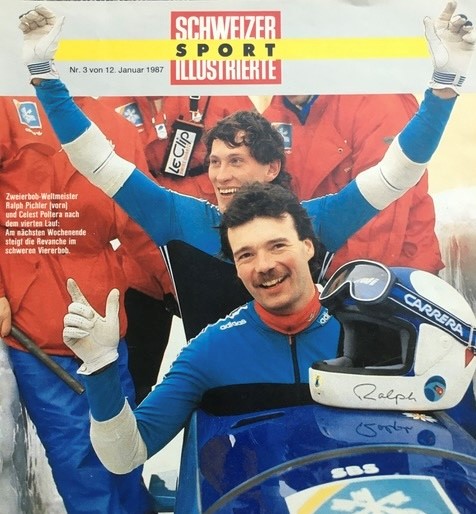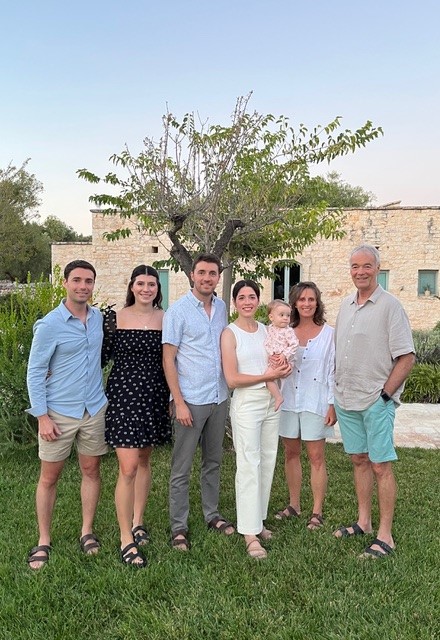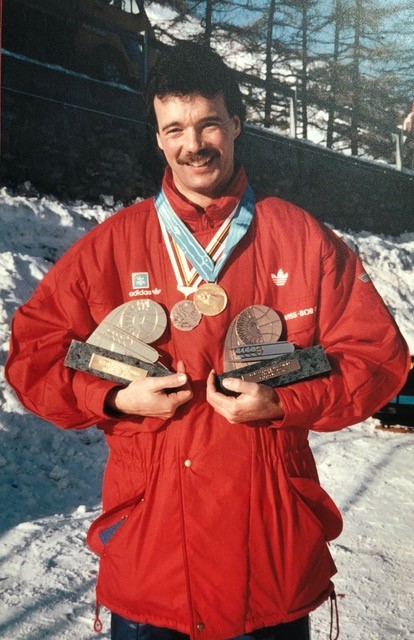

By
Katie Dangerfield &
Katherine Ward
Global News
Published December 27, 2023
6 min read

Amid the twinkling lights and festive cheer, Olympic bobsledder Ralph Pichler, 69, is counting his blessings this Christmas, having triumphed over a harrowing battle with heart failure a little over two years ago.
Pichler, a two-time world champion bobsledder, was diagnosed with heart failure in December 2021 during a visit to the University Health Network’s Peter Munk Cardiac Centre in Toronto. At the time he was given two options: palliative care or a left ventricular assist device (LVAD), also known as a mechanical heart.
Pichler opted for the latter, telling Global News that his organs were shutting down and was told he had little time left to live.
“I was just so weak I could only walk 10 steps, then I had to sit down and recover,” he said. “It was an avalanche hitting me, and since I had no other option, I trusted the team of doctors, and I went ahead with everything.”

Despite the doctors saying he had a 20 per cent chance of dying before Christmas, Pichler remained resolute in his determination to spend the holiday with his family.
Remarkably, just 12 days after his surgery on Dec. 10, 2021, he was back home recovering with his loved ones.
Now, two years later, as this holiday season unfolds, Pichler finds himself surrounded by the warmth of family, a new granddaughter named Emma, and the gentle hum of the mechanical heart that became his lifeline.
“Christmas will always be very special for me now. A reminder of what I went through,” he said.
Growing up in Switzerland, Pichler said he was active in his early years, playing soccer and running track and field.
“I got recruited to bobsledding because they were looking for fast people … and then I ended up in two Olympics,” he said.
He went on to represent Switzerland during the 1984 Winter Olympics in Sarajevo, Bosnia and the 1988 Winter Olympics in Calgary.
His Olympic journey is also how he met his wife Marla Pichler, a physiotherapist for Team Canada during the Sarajevo Olympics.

“Ralph had a very bad crash at the pre-Olympic event, and so a Canadian athlete said to him, ‘Well, come see our doctor.’ And so he came to the Canadian house to see an orthopaedic surgeon and for physio, and so I was asked to treat him,” Marla said.
Four years later, they got married and they’ve been together since.
Pichler has been active his entire life. He grew up playing soccer and was on the track and field team. And so when he started to slow down in his 60s, he said he thought it was just due to aging.
“I thought I just was aging because I was short of breath when I went for a hike or was climbing the stairs,” he said. “But then I eventually realized something else was happening.”
Marla also noticed a change in his health after Thanksgiving in 2021 when he began “huffing and puffing” during their walks. Initially attributing it to aging, the family grew concerned as persistent coughing emerged.

Following some research and ruling out a COVID-19 diagnosis, Marla began to suspect that the symptoms might be related to his heart.
That’s when the family decided he should see a heart specialist in Toronto, where he immediately was diagnosed with a left ventricle heart problem, meaning his heart was becoming weaker.

“It was a total shock because I never thought that I would end up there because I was always living a healthy lifestyle, diet and exercise-wise,” Pichler said.
Once diagnosed, Pichler quickly went into cardiogenic shock and was immediately transferred from the hospital ward into the cardiac intensive care unit, which his wife Marla called her “scariest moment.”
Dr. Vivek Rao, surgical director of the mechanical circulatory support program at the Peter Munk Cardiac Centre, was one of the specialists treating Pichler.
“Ralph was a unique individual. We don’t get too many Olympians that come through our doors that have heart failure,” he said, adding that after diagnosing him, the team of medical experts realized there were too many medical issues that prevented him from being a transplant candidate.
Pichler’s health was deteriorating so fast that Rao said that even if a suitable heart became available, time was a luxury they couldn’t afford. Faced with this imminent crisis, the medical team took immediate action.
They put Pichler on an intravenous (IV) drop overnight, which saved his life. And that’s when he was given the options of palliative care or getting an LVAD.

An LVAD is a mechanical pump used to increase the amount of blood that flows through the body. Implanted directly into the heart, the device is attached by an electrical wire to an external battery, or an electrical outlet, and a palm-sized computerized controller via an incision in the chest.
“Generally speaking, when we evaluate patients for what we call advanced heart failure therapies, we tell them that if you meet candidacy, in our team’s belief, you have a 20 per cent chance of dying within the next year from your heart failure,” Rao explained.
“So for Ralph, that was the prognosis that we had for him, is that there was a one in five chance that he wouldn’t be alive by Christmas 2021.”
But Richler pulled through and his LVAD gave him a new lease on life.
“He and Marla thought of it as a Christmas present for them, and he was adamant that he was going to leave the hospital before Christmas, and he did,” Rao said.
More than two years after the life-saving surgery, Pichler said he is as active as ever, gardening, pushing the lawnmower, travelling and bicycling.
The only activity he can’t do is swim.
That’s because the LVAD requires Pichler to be attached to batteries, serving as a constant source of power for the mechanical heart.
“I do have to deal with equipment and batteries every day of my life. I can never jump in the lake again because electricity and water don’t go well,” he said.
“But in the big picture. It’s really nothing compared to how it could have ended up. ”
The LVAD system Richler was given has around 10 to 12 hours of battery life before he has to charge it up again.
“The number one quality-of-life drawback from these devices is that there is an electrically powered device. And the analogy I use of the patients is it’s just like the fancy watches, which they’re water resistant, but they’re not waterproof,” Rao said.
Despite the drawback, Rap said the ultimate goal of this type of heart therapy is to give people a “predictable and durable option” for their heart failure.

A heart transplant is still the gold standard, he said, but he believes the future of LVAD technology could provide a suitable replacement.
“Every year, around 2,000 patients in Canada develop end-stage heart disease and are sick enough that they would benefit from advanced heart failure therapies,” Rao said.
He remains uncertain about the underlying cause of Pichler’s initial heart failure. However, he holds the belief that Pichler’s background as an Olympian contributed to a swifter recovery compared with many other patients he has encountered.
Pichler agreed.
“I have more strength than the year before I went down,” he said.
“I also became a grandfather, which makes me emotional. I have a beautiful family and that keeps me going,” he said. “It’s it’s all a bonus to me. I appreciate things much more than I did before.”



Comments